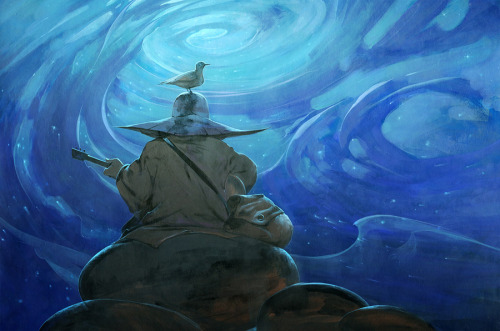Some Dnd Backstory Ideas That Give Your Character A Reason To Leave Home That Isn’t “everyone In
some dnd backstory ideas that give your character a reason to leave home that isn’t “everyone in my family died.” (just to say: i have nothing against those backstories (i use them a lot), but its fun to mix it up!)
family/friends/personal
someone close to you is sick. you need to adventure to find a cure
someone stole something important from you and you need to find it
you’ve received a message from a long lost relative and are trying to find them
someone that you love has been kidnapped (maybe you have to earn money to pay a ransom or complete some deed…)
adventuring runs in the family! everyone is expected to complete one quest in their lives
your family/culture sends people out to complete certain tasks when they reach a certain age as a rite of passage
another player’s character saved you in the past so you feel indebted to them and travel with them, protecting/aiding them
there’s a magical drought in your hometown and you have to fix it
your hometown doesn’t have a lot of jobs so you have to travel and send money back home
some childhood friends and you made a “scavenger hunt” where you try and complete a checklist of certain tasks (ie. defeat a barbarian in hand to hand combat, steal x amount of gold, slay a dragon, etc) in an allotted amount of time
quests/jobs
a god/patron has sent you on a quest to do something for them
you’ve been hired by someone to complete a task (and you get sucked into the big adventure along the way)
you’re on a quest for knowledge. maybe it’s to learn the best ways of fighting, maybe it’s something more academic related
your priest received a vision from your god and they sent you on a quest
you’re writing a book about the world and different cultures and you need first hand experience
you’ve found every map you’ve come across is shitty, so you decide to become a cartographer and make your own
you’re a detective who helps solve crimes and need to travel to solve a particular case
you’re a collector of a certain object and travel across the land to find it
you’re apart of an adventuring academy and have to complete a quest to graduate
you’re an artisan and you travel with your wares, trying to sell them. alternatively, you’re trying to spread word of your business and gain new business partners
you worked at a tavern your whole life where an old bard would sing songs of their adventuring party and that inspired you to go and do some adventuring of your own
feel free to add some of your own!
More Posts from Bungeonsandbagons and Others

Nadier’s Nightblade by Randy Vargas

Deity: The Walker of the Wheel
“ Traveler! Why don’t you pull up a stone and rest your weary self, Come share a tale, join me in a song. Between us there are as many miles to go as there are stars uncounted, but maybe we can number a few of them before we’re through”.
Setup: There are some gods that demand the worship of all, who seek to spread their gospals to the four corners of the earth. Then there are the small gods, the humble guardians who preside over their little corner of reality and ensure those who journey through it are well taken care of.
The Walker of the Wheel is one of the latter, a guardian god of roads, travelers, and the infinite horizon who protects those who venture far from home. Appearing as a broken down tramp, a traveling mapmaker, or an adventurous youth, the Walker eschews a concrete identity or even a name, preferring to intercede in the guise of a fellow wanderer rather than act through miracles or celestial agents.
Holding no temples save for the small roadside shrines erected by fellow travelers, the existence of the Walker is lore held only by those who live their lives on the road, cobbled together out of scraps of road-lore and tales of secondhand encounters.
Astral travelers are also known to draw the attention of the Walker, who holds stewardship over forgotten gateways between the realms.
Adventure Hooks:
Exhausted and woefully lost with darkness closing in, the party hears the plucking of an old guitar drifting across the landscape, leading them to a small campsite and the hermit who presides over it. The old codger offers them hospitality and a drag off his jug of barleywine, in exchange for their tales of adventure and woe. When the party awakes in the morning, they’ll find the Walker gone and themselves a stonesthrow from their destination, having crossed valleys and rivers in the span of a single night.
Those that impress the Walker are likely to be rewarded with good luck charms touched by a bit of his divine grace. Dented compasses that point the way home, guitar picks that conjure visions of the past when used to strum a nostalgic song, well worn walking sticks that allow for tireless travel over harsh terrain. These items all show evidence of having many owners in the past, as well as handetched patterns of stars and constellations.
While generally a god of good spirits, the Walker cannot stand those who prey upon travelers, and woe to any robber or highwayman who draw his attention. The party bears witness to this wrath when bandits attack their inn, hoping to kidnap and ransom a merchant who also happens to be staying there for the night. The Walker appears partway through this standoff, and with a strike of his stick dissolves the bandit’s leader into a pile of road dust.
Titles: Our Old friend, Master Dust, The Starry Hermit, Wornboot Bill, The Roadwarden
Signs: Whirling Stars and Nebulas, music on the edge of exhaustion, dreamlike landscapes.
Symbols: Hobo Marks, Migratory birds, A long road beyond a gateway.

Intrigue: Baroness Magali Turcas, Lady of the Court and Daughter of The King’s justice.
“You know why I brought you here? Because you’re a nobody, and I admire that. If you were a somebody around this court it invariably means that my father or his father tortured someone very important to you, and that means you’d be to intimidated by me to engage in conversation. Are you intimidated by me? Good, go and fetch us some drinks and I’ll tell you everyone’s dirty little secrets.”
All great courts employ torturers and executioners, but it’s only the cruellest of monarchs who have such need of these grim servants that they’d grant them lands and titles.
Such was the case for the Turcas family, simple but loyal jailers who found themselves elevated when during an attempted palace coup, their patriarch helped prevent the escape of the King’s leading political rival, thereby stifling the nascent rebellion, and preventing a civil war.
Magail Turcas grew up the beneficiary of her father’s windfall, educated along with the children of the court as befitted a young lady of nobility, but was continually excluded due to her family’s infamous reputation. Ever the outsider, Magali became a gossip and rumormonger, exposing the secret weaknesses of her rivals and dismantling reputations with the same vicious practicality that her forebears used to dismantle bodies.
Adventure Hooks
With the old king dying and an executioner sized ax to grind, Magali looks to cement her position as an indispensable fixture of the court, leveraging her web of informants and proxies into an actual spy network. Becoming master of whispers isn’t going to be easy, and she seeks competent agents who don’t mind digging up dirt or slinging mud on her behalf.
Having earned an enemy among the member of nobility, the party is approached by Baroness Magali after they’ve been backed into a corner: Bounties on their head, thrown into prison, assassins out for their blood. Magali offers to remove these obstructions, along with promises of financial and social assistance, provided they’re willing to help her destroy the antagonistic noble, and take public credit for their downfall.
Investigating a crime, the party comes across evidence that an otherwise inconspicuous servant was observing the proceedings and sending coded messages to an unknown benefactor. Breaking the code could provide vital information, but the servant is one of Magali’s loyal spies, and will not betray his mistress, even under threat of violence. IF the party wants this shortcut in their cimesolving escapades, they’ll need to broker a meeting with the would-be spymaster, and perhaps put themselves in her debt in exchange for some much needed clues.
Keep reading
✒ Solo RPGs
About a month ago I went down a rabbit hole and came out the other side absolutely obsessed.
A singular post on r/fountainpens notified me to the existence of Solo Journaling RPGs- literally, tabletop experiences that you play by yourself. Some of these games have physical components, but many are played entirely with a pen and a piece of paper.
Needless to say, I was absolutely thrilled at the concept of being able to scratch that TTRPG itch without the social drain, impossible scheduling, AND with the bonus of using up my enormous stores of fountain pen inks. Since the middle of November I have tried three separate Solo RPGs, with one being a longer experience with a physical book with rules and tables...with the other two finished experiences being short, one-to-two page PDF's that can be played out in several hours.
✒ Experiences so far...
During my first attempt I tackled a larger-than-anticipated RPG called Apothecaria. In this game, you are sent a letter by a witch who wishes for you to take her place making potions in the town of High Rannock. You gather reagents, explore, make potions, and develop your reputation and relationships with characters in town. Very Stardew Valley inspired, but with a fun, witchy twist. There is also a cute animal version called Apawthecaria, as well as a few expansions for the main game, which I have yet to look at.
I was excited to start but otherwise clueless about the typical pacing and play of journaling RPGs, and soon found that I was writing way too much information!! My hand got tired, and I put it aside for the time being. I will have to revisit it soon, as it is DISGUSTINGLY cute and fun, but for now I have focused my sights on smaller experiences.
During my second, I played a cute little experience called Last Tea Shop. The game has since released a "full" version with more mechanics, but I found the classic version to be exactly what I was looking for on a lazy saturday night. It took me about 4.5 hours to complete thanks to several distractions, but the playtime was probably closer to 3.
I found this to be a strangely emotional little experience, which probably should have been expected since you are playing as a shopkeep at the edge between life and death. I will admit to shedding a few tears by the end of my journey- but they were happy ones. I will be returning for the full version sometime after I have let the experience settle.
My most recent experience-- as of maybe 30 minutes ago, to be precise-- is a lesser-known RPG called Axe Wielding Priest. This was a wonderful switch up from the cozy games I have tried so far, and as a person who adores a good (but understandably controversial) "sanity" mechanic in a game, it scratched my itch for madness.
There are some warnings in the description for blood, self-harm (flagellation), violence, and paranoia, but I thoroughly enjoyed the 2 hours I spent exploring the mind and history of my character.
✒ Conclusion
I am absolutely obsessed. I'm always itching to come up with stories, but have burned many a role-playing partner by being flaky or losing interest. These offer a few overarching mechanics and rules and otherwise let your mind run free. That sense of loose structure is exactly what I need as someone who struggles with ADHD, but also enjoys coming up with solutions within a set boundary.
There are "old-school" solo RPGs out there, as well as others that aren't just acting as a tool for creative writing. I will be trying some of those out as well as the time comes, as well as the games that use physical maps and movement around a grid.
What are some ttrpg's on your game wish list? Ones that you'd want to play or plan to play (or maybe don't have time to). also as a side note your love for ttrpg's fills me with a lot of joy and reminds me why they're so special! : )
Inevitable: COWBOY KNIGHTS TRAGEDY this is number one i wanna play this so bad with a crew who will watch a few anti-westerns and arthurian films beforehand and fully commit to the tragedy aspect (big bold decisions if you know it ends in tragedy!) oh my god this specific flavor of game appeals to me a little too specifically
some kind of horror game. VTM, Curse of Strahd, Shadow of the Demon Lord, Call of Cthulhu, whatever lends itself to horror well. the horror genre is one of my favorites and i would so be down to play some good horror!!
MASKS as a PC!
and always more dnd.
uhhh I'm sure there would be other things but I don't know many ttrpgs off the top of my head. quite like ttrpgs. would very much like to play more. especially with a group of artists who will post dodoles and songs that remind them of characters and talk about them throughout the week and do psychological deep dives and theorize about the story and themes and and and
do you have any resources or guides for worldbuilding and reimagining the feywild? not looking for adventure prompts or npcs just your thoughts on setting and how to make the feywild feel dangerous and mystical

Planescape: The Feywild
I won’t lie, the introduction if the feywild is one of the best additions to the default d&d cosmology in a while, not only from a thematic perspective, but gameplay aswell, as it allows any podunk patch of land to act as a doorway to wild adventure. That said, too often this wonderland is treated as a place where things are just wacky, without real attention paid to the narrative possibilities introducing the feywild into a story can have.
To that end, I’m going propose a few different aspects of the feywild, different visions of how things could be drawn from different mythologies and storytelling conventions:
The feywild has no geography: like the notes of a song or the lines of a play, the reality of faerie is reinterpreted with every visitation, Coloring itself based on the expectations and emotions of those exploring it. This is why a child can stumble into a mushroom ring and have themselves a whimsical romp full of talking animal friends and life lessons, whereas adults tend to find themselves ensnared by echoes of their deepest desires and why adventurers ALWAYS find something to fight. If you want to go anywhere in the feywild you don’t need a map, you need a thematic structure that will carry you to your destination: whether that be staying on a yellow brick road through a number of distractions and tribulations, or winning a game of riddles against a talking bird who’ll swear to drop you off at your destination.
The feywild is a place of stories: When a peasant family leaves out milk and performs small acts of thanks for the brownie, they are unwittingly inviting the primal energies of the feywild to fill the space they have made for it, creating a creature that had always been there, looking out for them. Likewise, when folk tell of wonderous places just beyond the edge of the map, the feywild becomes those places, taking solidity from repeated tellings of the tale and incorporating different interpretations to give themselves depth. This is not to say that the translation is perfect, as one can’t simply make up a story, tell it to an audience, and expect it to suddenly become true as it takes a powerful and engrained sort of lies, embelishment, or folktales to give shape to the otherworld. When populating your local fairy-realm or those areas near enough to it, consider what sort of stories people tell about that place, whether it be about monsters that gobble up wayward children or treasure hidden there by bandits long ago.
The feywild responds to your emotions: When your party takes a rest, ask them how they think their characters are feeling. Consider whether they are frightened or foolheardy, adventurous or avricious, and then sketch out some random encounter to spice in along the way as the realm of whimsy responds to the vibes they’re putting out. A party that’s feeling hungry may encounter a friendly fey teaparty or a dangerous lure disguised as a snack, a group that’s feeling pressed for time may hear the horn of a savage hunter stalking them, or a parable about stopping to help others can actually speed you along your own path. In this way, the fairyland is in diolog with the party’s desire to press their narrative forward, and will test or reward them according to its whim.
The feywild is everywhere: one of the underutilized aspects of having the feywild in our games is that a portal to the “shallower” areas of the otherworld can pop up anywhere overtaken by nature, allowing fey beings and other oddities to cross over in a way that creates all manner of adventure hooks. If I’m building a dungeon in the wilderness, I’m personally fond of having a mounting fey presence the deeper in you get, replacing the normal ruin dwelling hazards with troops of hobgoblins, odd enchantments, and various tricksters. For smaller dungeons, the closed off fey portal can be an adventure hook for later, encouraging them to come back when they need to delve into whimsy, whereas for the larger dungeons, a non contiguous fey realm connecting multiple points can serve as a combination of fast travel AND bonus stage. Even for non dungeon locations, consider how much fun of an adventure it’d be if someone discovered that their cellar had been replaced with a fairy’s larder, or that the vine-covered lot where neighborhood kids play during the day transforms into a vast battlefield for sprites during the night.
sixty-nine more questions for your ttrpg characters!
(i originally made one of these on a defunct sideblog; i thought it was about time i made a new one! send an oc’s name and a number, go wild!)
-
1. what drives them? what’s their ultimate goal?
2. what was your original concept for this character? how did playing them change that concept?
3. can they accept failure?
4. what one person, place, or thing do they love more than anything else?
5. is there something they want to be known for?
6. how have they changed in the last year? how about the last five years?
7. there’s a magic item (or technological innovation, or special resource) made just for them—what is it?
8. what songs remind you of them? if there are specific lyrics or movements, list ‘em!
9. when in their life were they most scared?
10. what inspired this character’s creation?
11. if they have a pet or animal companion, how do they spend time with them? if they don’t have one, what sort of animal would they be interested in raising, if any?
12. how have they altered their body? piercings, tattoos, biohacks, or other modifications—anything. why (or why not) did they (or someone else) make those changes?
13. what are some motifs you associate with them? did you intentionally bring in those motifs, or did it happen over time?
14. what keeps them up at night?
15. is there something that never fails to make them laugh?
16. do they value their appearance?
17. they’re crying—what did it take to make them cry?
18. what dish brings back the best memories for them?
19. what sparks genuine, unadulterated rage in them?
20. what attracts them to someone—platonically and/or romantically, anything counts.
21. do they have an idea about how they’ll die? do you?
22. how would they decorate their living space, if they had a chance?
23. in what moment did they consider themselves to be “grown up”?
24. are they close to any family members?
25. who is their best friend?
26. what type of person pisses them off?
27. how do they usually dress? why do they dress the way they do?
28. do they collect anything?
29. what feelings do they internalize?
30. how do they handle confrontation?
31. do they respond well to praise? how about criticism?
32. which of your decisions led to their voice being the way it is?
33. what artistic medium are they most drawn to?
34. what languages do they speak? how did they learn them?
35. when did they feel loneliest?
36. how do they fidget?
37. if they’ve had one, what was their first kiss like?
38. do they see themselves as an important part of their party?
39. are they insecure about their appearance? how about their personality? what aspects specifically worry them?
40. if you had to remake this character right now, how would you change them?’
41. how do you keep notes for this character, if at all?
42. can they dance?
43. how much do they know about the world they live in?
44. what lies do they tell others?
45. what lies do they tell themselves?
46. have they taught themselves any skills just for fun?
47. what could they talk about for hours on end?
48. do they relate to anyone in their group? conversely, which person do they relate to the least?
49. how often do they cut their hair, if at all?
50. do they have a go-to beverage, alcoholic or nonalcoholic?
51. what element of their backstory are you proudest of?
52. how would they dress themselves up for a formal event?
53. do they keep their plans close to their chest?
54. how important is money in their life? do they save up for ages, or spend quickly?
55. they’re seeing their greatest wish come true—what’s happening?
56. who would they trust with their life, unequivocally?
57. do they see value in the laws of where they live?
58. how often do they swear? do they mind when others swear?
59. what’s an element of their philosophy that you disagree with?
60. what do they have faith in? what keeps them believing?
61. is there an in-game moment of theirs you think about and just laugh?
62. do they believe in good and evil?
63. what’s a meme or tiktok or vine (or whatever) that you associate with them?
64. how would a party member describe them?
65. what would their go-to karaoke song be?
66. which fruit do they like most?
67. do they consider themselves to be special?
68. where’s their home?
69. what’s one secret they don’t want getting out?









CUTE Pathfinder 2e Character Sheets just dropped!! 🎉🎉🎉
Find them here!
Writing Angry Scenes: Tips to Avoid Melodrama and Make It Real
Anger can be one of the most intense, relatable emotions to read—and one of the trickiest to write. When handled well, an angry scene can pull readers deep into the emotional world of a character, building tension and driving the story forward. But when handled poorly, anger can easily slip into melodrama, making the character’s feelings seem overblown, forced, or even cringe-worthy.
So how can you avoid these pitfalls and write anger that feels real and compelling? Here are some tips to make angry scenes powerful without overdoing it.
1. Understand What Fuels Your Character’s Anger
To write anger authentically, you need to understand its roots. People get angry for complex reasons—fear, frustration, betrayal, grief, and even love. Ask yourself what’s truly driving your character’s anger. Are they afraid of losing control? Do they feel abandoned or misunderstood? Are they hurt by someone they trusted? Anger rarely exists in isolation, so dig into the deeper emotions fueling it.
When you understand the core reasons behind a character’s anger, you can weave those nuances into the scene, making the anger more relatable and layered. Readers will feel the depth of the character's rage, not just the surface heat of it.
2. Show, Don’t Tell—But Don’t Overdo It
“Show, don’t tell” is classic writing advice, but it’s especially crucial in angry scenes. Don’t rely on generic phrases like “She was furious” or “He clenched his fists in anger.” Instead, look for unique ways to convey how this specific character experiences anger. Maybe their voice drops to a deadly calm, or their eyes narrow in a way that makes everyone around them uncomfortable.
That said, showing too much can backfire, especially with exaggerated descriptions. Over-the-top body language, excessive shouting, or too many “flaring nostrils” can tip the scene into melodrama. Use body language and physical cues sparingly and mix them with subtler reactions for a more realistic portrayal.
3. Use Dialogue to Reveal Hidden Layers
People rarely say exactly what they feel, especially when they’re angry. Angry dialogue isn’t just about yelling or throwing out insults; it’s an opportunity to show the character’s deeper thoughts and vulnerabilities.
Consider using controlled, icy responses or unexpected silences. Maybe your character says something hurtful in a low voice rather than screaming. They might express sarcasm, avoidance, or even laugh at the wrong moment. Anger often carries hidden layers, and using these nuances can help your character’s dialogue feel genuine, even haunting, without falling into dramatic clichés.
4. Control the Pacing of the Scene
The pacing of an angry scene can be the difference between a powerful moment and a melodramatic one. In real life, anger doesn’t always erupt instantly; it can simmer, spike, or deflate depending on the situation and the character’s personality. Experiment with different pacing techniques to create tension.
You might build the anger slowly, with small signs that something’s brewing. Or maybe the character explodes suddenly, only to calm down just as quickly, leaving a chill in the air. Controlling the pace helps you control the reader’s emotional engagement, drawing them in without overwhelming them.
5. Avoid Clichéd Expressions and Overused Reactions
When writing anger, avoid falling back on clichés like “seeing red,” “boiling with rage,” or “blood boiling.” These phrases have been overused to the point that they lose their impact. Instead, get creative and think about how your character’s anger might feel specifically to them.
Maybe their skin feels prickly, or their jaw aches from clenching it. Think about details that are unique to the character and to the moment. By focusing on small, unique sensory details, you’ll help readers feel the anger rather than just reading about it.
6. Let the Setting Reflect the Emotion
The setting can be an effective tool to amplify a character’s anger without overstating it. Small details in the environment—such as the hum of a refrigerator, the slow ticking of a clock, or the distant sounds of laughter—can create a sense of contrast or isolation that heightens the character’s rage.
For example, imagine a character seething in a peaceful park or a quiet library. The calm of the surroundings can make their anger feel more potent. Or maybe they’re in a crowded, noisy room where they feel unseen and unheard, which fuels their frustration further. This use of setting can add depth to the scene without the need for dramatic gestures.
7. Let Consequences Speak for Themselves
An effective way to avoid melodrama is to let the consequences of the anger show its intensity. Characters don’t always have to yell or physically react; sometimes, a single choice can convey more than any outburst.
Perhaps your character cuts off a close friend or says something they can’t take back. Maybe they throw away a meaningful object or walk out in silence. By focusing on the consequences of their anger, you can reveal the impact without over-explaining it.
8. Let the Emotion Simmer After the Scene Ends
Anger is rarely resolved in a single moment, and its effects often linger. When writing an angry scene, think about how it will affect your character moving forward. Are they holding onto grudges? Do they feel guilty or exhausted afterward? Does their anger transform into something else, like sadness or regret?
Allowing the anger to simmer in your character’s mind even after the scene ends creates a more authentic and layered portrayal. It shows that anger is complex and doesn’t just disappear the moment the scene is over, adding emotional weight to both the character and the story.
-
 allunwoven liked this · 2 weeks ago
allunwoven liked this · 2 weeks ago -
 adorkable-wonder liked this · 3 weeks ago
adorkable-wonder liked this · 3 weeks ago -
 adorkable-wonder reblogged this · 3 weeks ago
adorkable-wonder reblogged this · 3 weeks ago -
 moonlit-dungeon reblogged this · 3 weeks ago
moonlit-dungeon reblogged this · 3 weeks ago -
 sparkywrites25 reblogged this · 3 weeks ago
sparkywrites25 reblogged this · 3 weeks ago -
 1g-duck liked this · 4 weeks ago
1g-duck liked this · 4 weeks ago -
 w3r3wolfgirlfri3nd liked this · 4 weeks ago
w3r3wolfgirlfri3nd liked this · 4 weeks ago -
 friendoftheelves liked this · 1 month ago
friendoftheelves liked this · 1 month ago -
 greatsnakestintin reblogged this · 1 month ago
greatsnakestintin reblogged this · 1 month ago -
 undertopian liked this · 1 month ago
undertopian liked this · 1 month ago -
 ghost-help liked this · 1 month ago
ghost-help liked this · 1 month ago -
 cusstardcrush liked this · 1 month ago
cusstardcrush liked this · 1 month ago -
 greatsnakestintin reblogged this · 1 month ago
greatsnakestintin reblogged this · 1 month ago -
 tinyphantomsalad liked this · 1 month ago
tinyphantomsalad liked this · 1 month ago -
 horticulture-dreamland liked this · 1 month ago
horticulture-dreamland liked this · 1 month ago -
 rainwaterheart liked this · 1 month ago
rainwaterheart liked this · 1 month ago -
 feldsangel-archive reblogged this · 1 month ago
feldsangel-archive reblogged this · 1 month ago -
 saintcobalt liked this · 1 month ago
saintcobalt liked this · 1 month ago -
 shredded-angel-wings liked this · 1 month ago
shredded-angel-wings liked this · 1 month ago -
 horoscopebeauty reblogged this · 1 month ago
horoscopebeauty reblogged this · 1 month ago -
 raaafl reblogged this · 1 month ago
raaafl reblogged this · 1 month ago -
 octoorca reblogged this · 1 month ago
octoorca reblogged this · 1 month ago -
 8-birdparagon liked this · 1 month ago
8-birdparagon liked this · 1 month ago -
 sadisticviking liked this · 1 month ago
sadisticviking liked this · 1 month ago -
 mohnea liked this · 1 month ago
mohnea liked this · 1 month ago -
 aniallia reblogged this · 1 month ago
aniallia reblogged this · 1 month ago -
 tsundereace reblogged this · 1 month ago
tsundereace reblogged this · 1 month ago -
 tsundereace liked this · 1 month ago
tsundereace liked this · 1 month ago -
 alwaysthecleric reblogged this · 1 month ago
alwaysthecleric reblogged this · 1 month ago -
 hiddensquid13 reblogged this · 1 month ago
hiddensquid13 reblogged this · 1 month ago -
 dungeon-apprentice reblogged this · 1 month ago
dungeon-apprentice reblogged this · 1 month ago -
 ultrablueberryme liked this · 1 month ago
ultrablueberryme liked this · 1 month ago -
 mackelleo liked this · 1 month ago
mackelleo liked this · 1 month ago -
 mackelleo reblogged this · 1 month ago
mackelleo reblogged this · 1 month ago -
 necromancing-and-archiving reblogged this · 1 month ago
necromancing-and-archiving reblogged this · 1 month ago -
 maighstirdan liked this · 1 month ago
maighstirdan liked this · 1 month ago -
 tutorial-stuff reblogged this · 1 month ago
tutorial-stuff reblogged this · 1 month ago -
 missy-jabby-idea-stuff reblogged this · 1 month ago
missy-jabby-idea-stuff reblogged this · 1 month ago -
 missy-jabby-junks reblogged this · 1 month ago
missy-jabby-junks reblogged this · 1 month ago -
 missy-jabby liked this · 1 month ago
missy-jabby liked this · 1 month ago -
 alliedisastermaster reblogged this · 1 month ago
alliedisastermaster reblogged this · 1 month ago -
 brikkensord reblogged this · 1 month ago
brikkensord reblogged this · 1 month ago -
 scrollingkingfisher liked this · 1 month ago
scrollingkingfisher liked this · 1 month ago -
 seductivenougat reblogged this · 1 month ago
seductivenougat reblogged this · 1 month ago -
 seductivenougat liked this · 1 month ago
seductivenougat liked this · 1 month ago -
 temporaryhorse liked this · 1 month ago
temporaryhorse liked this · 1 month ago -
 ellias-elliott liked this · 1 month ago
ellias-elliott liked this · 1 month ago

94 posts